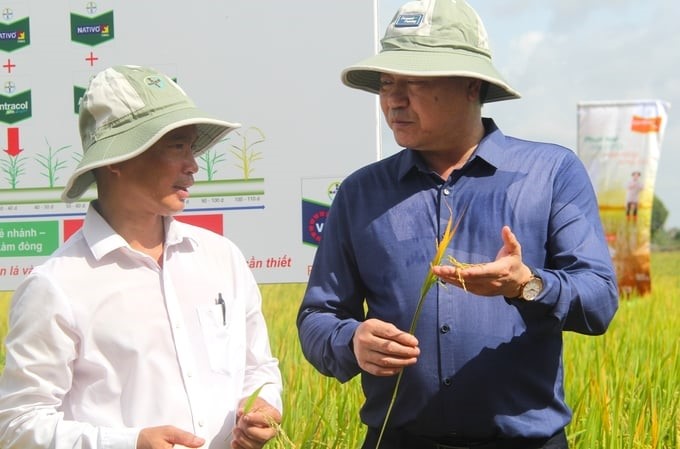- Giới thiệu
- Nhóm Công tác
- Tin tức
- Thông tin về FTA
- Tài Liệu
- Sự kiện
- Liên hệ
Forward Farming model helps reduce rice production costs by 1.5 to 4 million VND per hectare
National Agricultural Extension Center and Bayer Vietnam recently co-organized a series of field visits and discussions with farmers on solutions for developing the Forward Farming model.

The event featured a visit to a 2.4-hectare experimental production field in Dong Thuan commune, Thoi Lai district, Can Tho city. Additionally, experts and local farmers discussed advanced production methods during a seminar titled "Potential Expansion of the Forward Farming Model – Sustainable Agriculture Development in support of the Project for one million hectares of specialized, low-emission high-quality rice in association with green growth in the Mekong Delta region."
According to Le Quoc Thanh, Director of the National Agricultural Extension Center, the Center developed the "Sustainable Rice Production Development – Forward Farming" initiative in collaboration with Bayer Vietnam and several strategic partners in the rice production value chain. These partners include the Departments of Agriculture and Rural Development of Mekong Delta provinces; the Cuu Long Delta Rice Institute, Saigon Kim Hong Trading Services Co., Ltd; Binh Dien Fertilizer Joint Stock Company; and VinaRice Co., Ltd.
The Forward Farming model incorporates advanced domestic and international technologies to support farmers in reducing production costs for seeds, fertilizers, pesticides, and water; and minimizing environmental emissions. This approach enables farmers to produce high-quality rice products that meet the demands of challenging markets.
Le Quoc Thanh commended the model's results as well as the role of participating agencies. The National Agricultural Extension Center, Bayer Vietnam, and partners will develop a detailed implementation plan, and continue researching, developing and evaluating the effectiveness of applied technologies in order to expand the scope of the model. In addition, stakeholders will expand the network of strategic partners and training targets in the Mekong Delta provinces.
The success of the Forward Farming model has facilitated the expansion of advanced rice production practices in the Mekong Delta region; thereby contributing to the successful implementation of the Project for one million hectares of specialized, low-emission high-quality rice, as promoted by the Ministry of Agriculture and Rural Development.
Director Thanh encouraged farmers participating in the model to become agricultural extension workers that assist in guiding and disseminating the model to other farmers.
The forward Farming model has achieved numerous positive results over three separate crops. Most notably, the combination of suitable fertilization and irrigation methods and the application of Bayer's "Much More Rice" solution promoted the growth of rice plants under optimal conditions.
The model has reduced seed sowing quantities by 2.5 to 3 times, i.e: from between 150 and 180 kilograms per hectare to 60 kilograms per hectare; reduced water usage by nearly 50%, i.e: 110 cubic meters per hectare per crop; and reduced greenhouse gas emissions by 24.7%.
Moreover, the Forward Farming model allows farmers to reduce input costs by 1.5 to 4 million VND per hectare. These factors increased economic efficiency by 13.1 to 54.9% compared to that of traditional farming practices.
The model has provided training on high-quality rice production and the effective, safe, and responsible use of pesticides to over 4,500 farmers in An Giang, Kien Giang, and Can Tho city.
Key activities under the Forward Farming model include the integrated application of advanced rice production solutions and technologies on experimental fields, as well as effective emission control and environmental impact management. Additionally, the model supports the enhancement of farmers' capacity and knowledge for sustainable farming through training programs; and promotes public-private partnerships throughout the rice production value chain.
Tin liên quan
PSAV Attends the 30th Anniversary Celebration of Cargill Vietnam2025/10/23
Plant health management helps increase coffee yield up to 15%2025/10/16
An Giang to host 2025 OCOP forum for sustainable development2025/09/25
Viet Nam and France foster cooperation on blue economy and sustainable environment2025/09/29



 Điều lệ hoạt động
Điều lệ hoạt động



















































